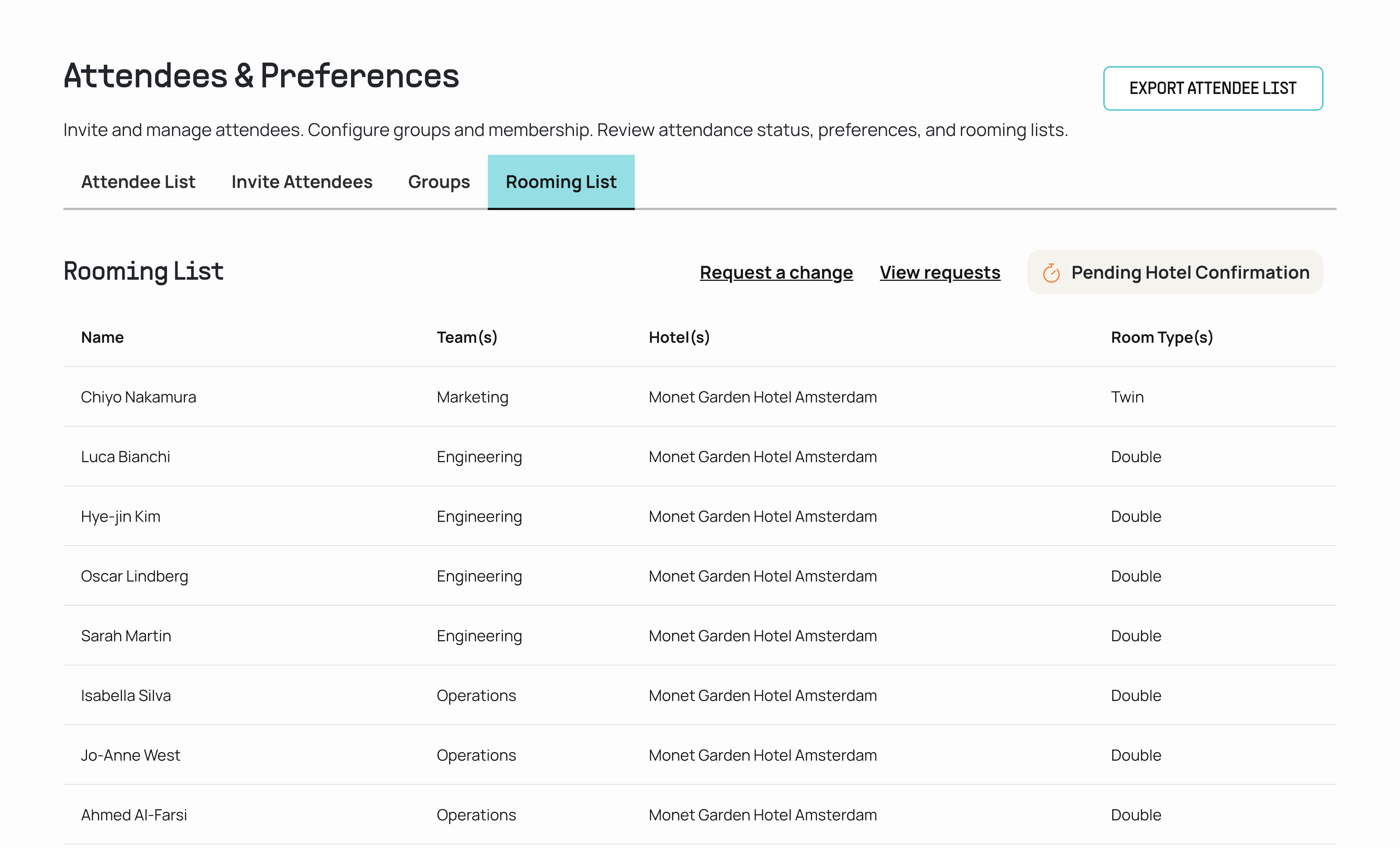Company events are a big deal. They’re a chance for people to spend time together away from the coffee machine, whether they’re working hard at problem solving or just having fun.
But for people like you that need to make an event happen, they can be unforgettable for different reasons. Trying to find the right accommodation, getting your attendees to confirm dates, sourcing the perfect venue, it’s not surprising that securing a good price for your hotels isn’t top of your priorities.
The good news is that it doesn’t have to be that way. We’ve put together this article to help you understand how to deliver effortless events whilst saving money. Even better it’s all unlocked by Impala’s Group Booking platform, which combines industry-leading tools with our negotiating prowess.
The basics of group booking
Normally, hotels consider any booking of more than 9 rooms by the same organisation to be a group booking. Since the hotel will be blocking out a large number of rooms in advance, they're at risk if your event is cancelled or there are a significant number of cancellations.
To manage this risk, hotels will handle your bookings differently for a large event. You’ll need details about how many people are coming, and what dates they’ll stay, as well as restrictions on how many rooms you can cancel and when.
More positively it means that hotels will give you significant discounts when you’re booking several rooms, or will throw in breakfast or meal discounts - depending on your negotiation skills.
Before check-in you'll need to create a rooming list - a document that shows all your guests and the dates they're attending. We'll provide more details on creating this further down.

Managing your attendees like a pro
First let's talk about the 'group' in Group Booking. If you've ever had to plan a trip with friends you'll know that getting everyone's information isn't easy.
Depending on your company's policies, and the type of event you're running you'll want to gather:
- What dates people are attending your event, including any optional social days.
- What dates they need accommodation. This can also include any additional travel days for long-haul travellers.
- Do they have any medical requirements for their room. This information helps the hotel avoid any surprises.
- If your company supports it, are they bringing a plus one. Since a lot of hotel rates are for single-occupancy there can sometimes be a charge if someone brings their partner.
Be ready for people's responses to change between planning your event and your actual event date. Give them an easy way to update information, and clear deadlines for when you need final confirmation.
Or better yet use Impala's Group Booking tools to manage your event. Add attendees to groups and control whether they can select additional days, share rooms, or bring +1s. Or if you prefer, manage your attendees directly yourself.
Choosing the right hotel
Finding the right accommodation is a balancing act. Whilst price is important, you'll also want to consider proximity to the event venue, available amenities, and the hotel’s capacity to meet your group's needs.
Depending on the scale of your event you may choose to spread your attendees across several properties, placing speakers and executives in 4-5 star properties and other attendees in 3-star. International attendees can be placed in hotels near to transit routes to and from the airport, reducing the complexity of getting to their hotel after a long flight.
Pricing and seasonality
The price you pay for a hotel room isn't the same from day to day. Factors like the day of the week, the time of year, or the overall availability of hotels in a location can drive changes even day to day.
For this reason it's vital to lock in a price early on to keep yourself on budget. Early booking will help to avoid some of the impacts of seasonality, but there's no getting around the higher costs for accommodation during public holidays or near the end of the year. If you're finding your budget is stretched then consider whether it's practical to select a more distant hotel and arrange transport for your employees. You can also ask employees to share rooms, cutting your costs in half. It's important to consider some of the safeguarding requirements here, and factor in a certain number of solo rooms.
Negotiations can also cover included extras. Hotels may provide complimentary breakfast for group bookings, or discounts and vouchers for their facilities. Make sure to discuss this with the hotel, and capture dietary preferences for your attendees.
Strategic negotiation
Effective negotiation requires thorough preparation. Understand your group's specific needs and what potential hotels can offer. Focus on negotiating points beyond price, such as flexibility in rooming options, cancellation policies, and additional amenities, to secure terms that cater to your group’s unique requirements.
Prepare a clear list of must-haves and nice-to-haves based on your group's priorities. Engage in open discussions with hotel representatives to explore potential compromises and ensure that both parties understand and agree to the terms. Demonstrating awareness of the hotel’s operational challenges while also advocating for your group’s needs can lead to more favorable outcomes.
With our experience negotiating corporate rates you can bypass the back and forth, and let Impala do the heavy lifting for you. All you have to do is raid the minibar and call for room service.
Make your rooming list and check it twice
Keeping your rooming list up to date with who's attending, when they're staying, and any needs they have will help the hotel prepare for specific requirements and simplifies check-in for your group.
Start by creating a comprehensive list that includes all attendees’ names, their stay durations, and any special requests such as room preferences or accessibility needs. You should also check your room allocation with the hotel, and allocate rooms depending on attendee needs (eg. single, double, twin). If any of your attendees are bringing a plus one, make sure that their rate allows two people in the room and whether your company or the attendee needs to pay for any additional costs.

You don't usually need to share your rooming list until close to your payment date. So make sure to communicate to your attendees consistently, and ensure they're keeping you informed of any changes. It's better if someone tells you they've cancelled than you find out on the day.
Additionally, consider the logistics of check-ins and check-outs, especially for large groups. Coordinate with the hotel to possibly stagger these times to prevent bottlenecks at the reception, ensuring a smooth flow for both your group and other guests.
Don't fancy juggling spreadsheets? Impala's Group Booking product has a built in rooming list that automatically assigns rooms based on group, needs, and location. We'll handle all the complexity, and keep you informed of any changes.
Your next event is a button away
Team events are worth it, despite all the complexity. Pulling off a successful event is an achievement, and you'll recognise the impact in the people around you.
Impala's Group Booking service exists to make every event a successful one, and to take the stress away from you without taking away control. You'll still be making your events unique, but we'll make sure that everyone's in the right place and that things stay on budget.
